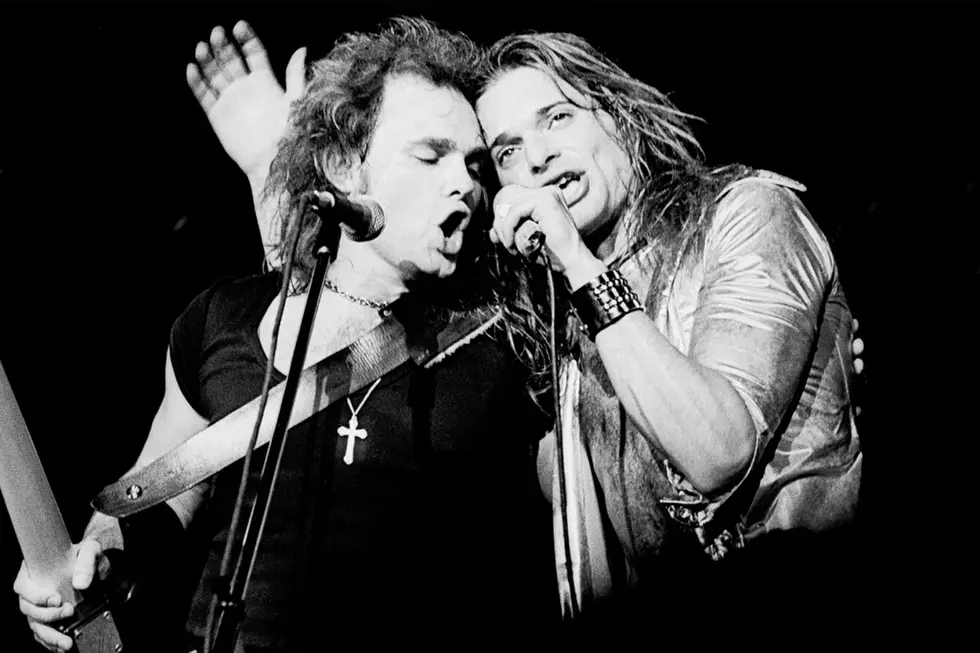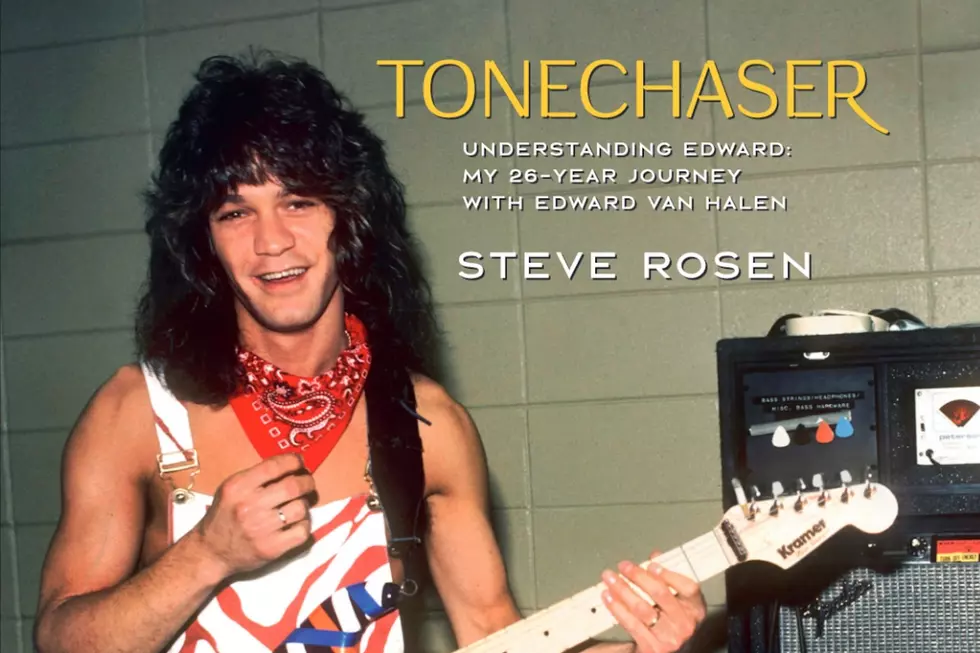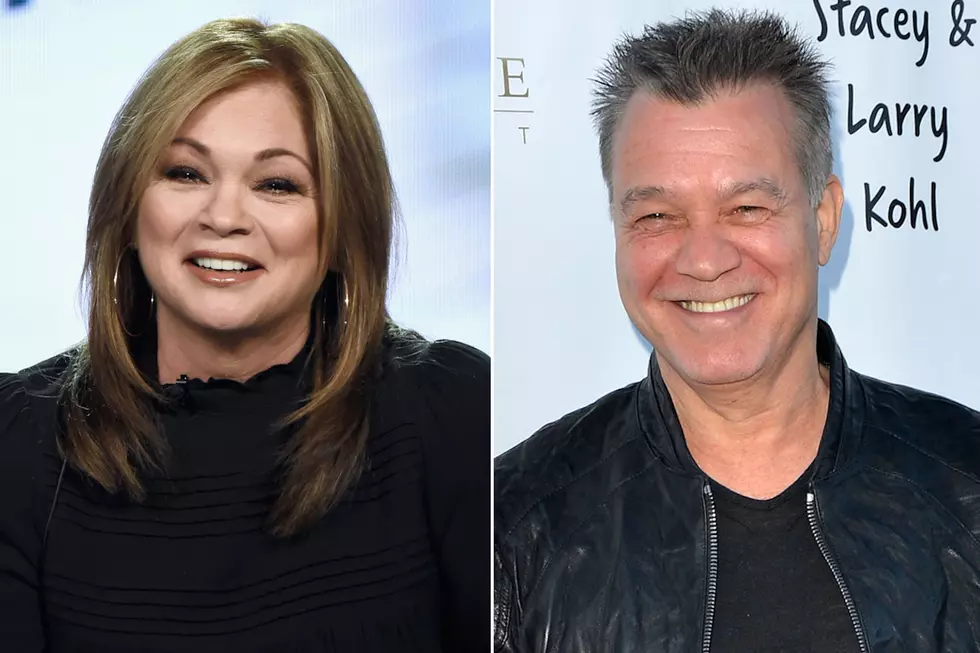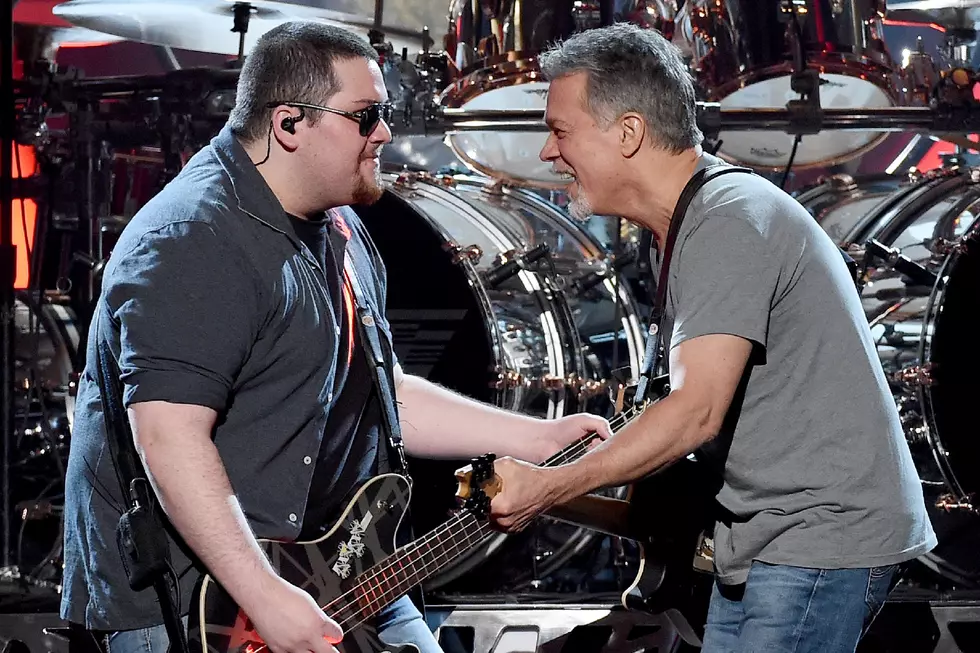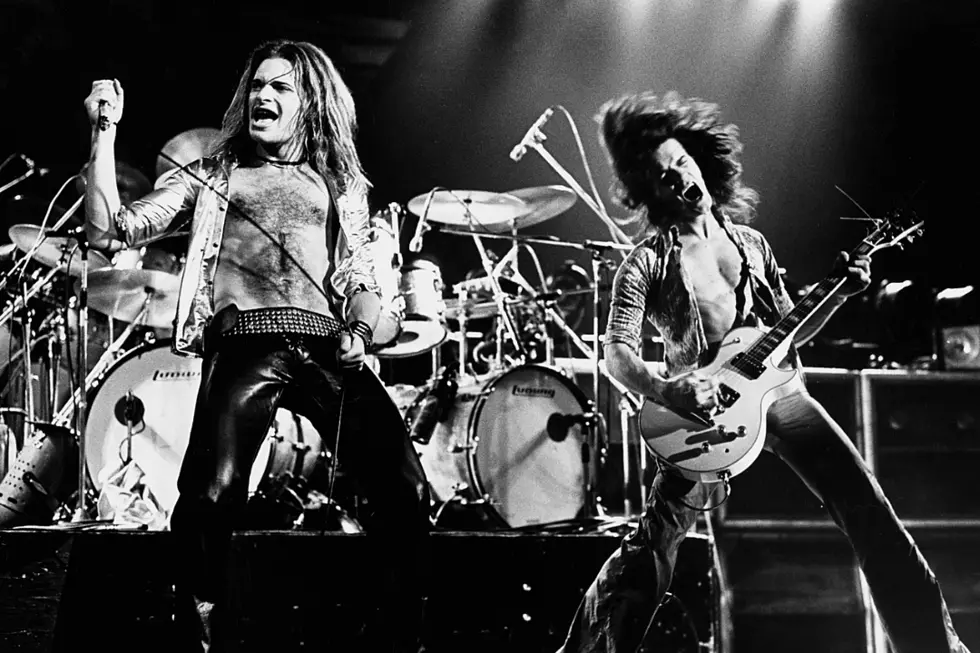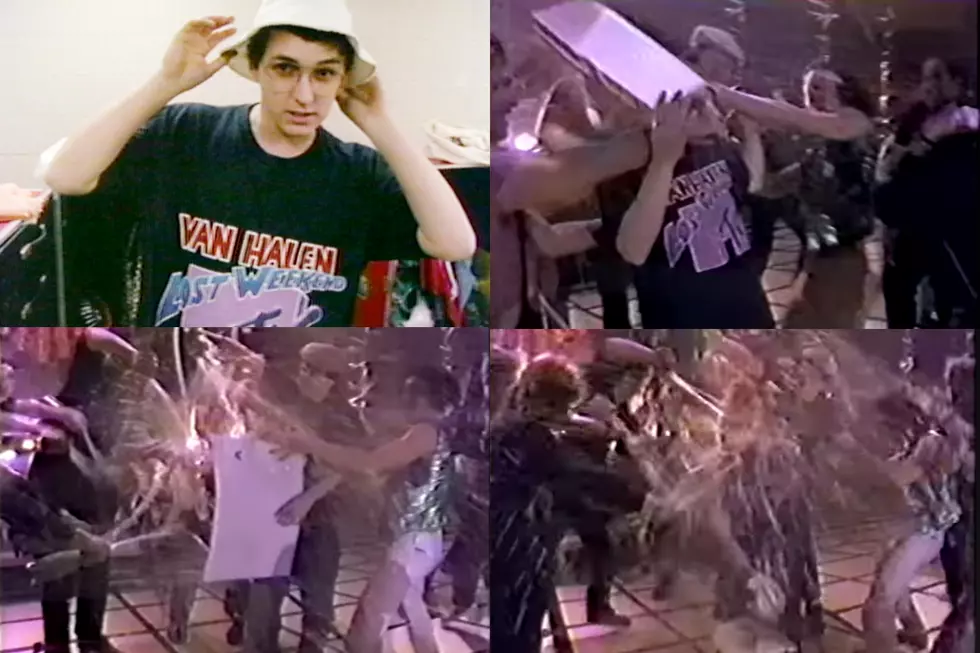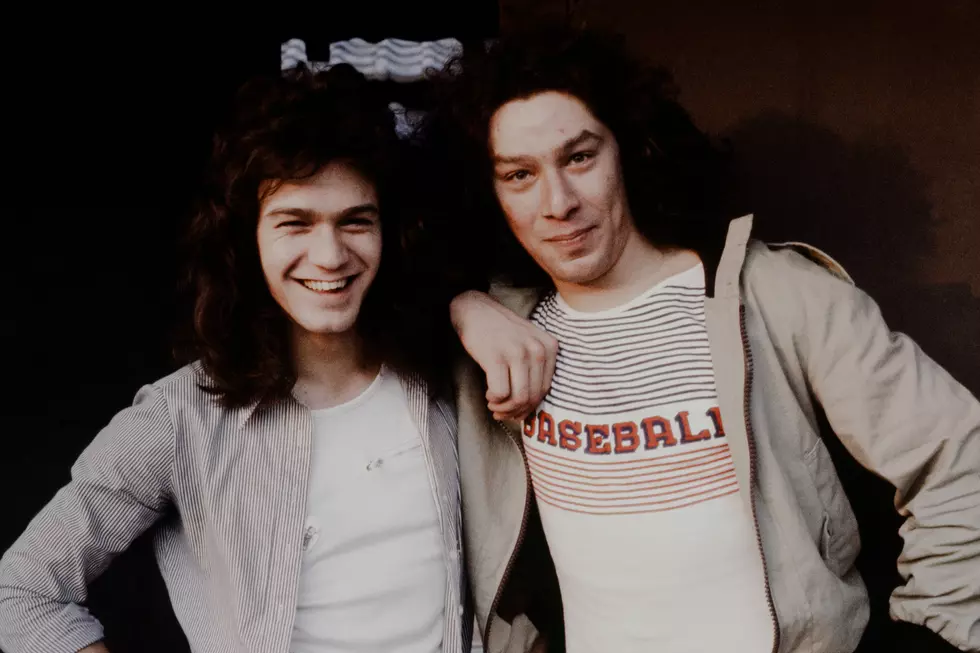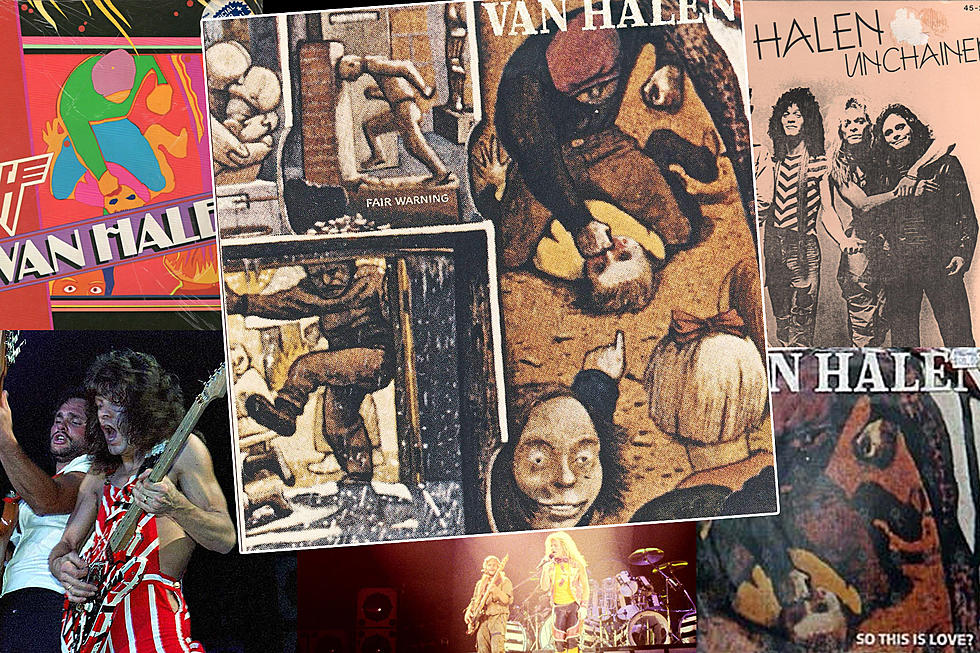
Van Halen’s ‘Fair Warning': A Track-by-Track Guide
Van Halen may have been one of the most popular rock bands in the country by late 1980, but they were wearing down when they headed into the studio to record their fourth album.
Released on April 29, 1981, Fair Warning remains the darkest in the band’s catalog and worst-selling LP by the original lineup featuring singer David Lee Roth. Still, it managed to climb to No. 5 on the Billboard 200 and eventually reach double-platinum status. More importantly, it's a fan favorite, partly because the record is so different from what preceded and followed.
Women and Children First (from 1980) was a breezy and familiar blast of jungle rhythms, carefree blues and thick, booming swagger. A lengthy world tour followed, after which, in November 1980, Van Halen began preproduction work on Fair Warning.
Like any band that spends too much time together, tensions started to build. There was a Helmut Newton photoshoot that threatened to derail the group; Eddie Van Halen’s whirlwind romance with Valerie Bertinelli also caused some friction. The two met in late August 1980, and that December, while Van Halen were recording Fair Warning, the couple got engaged. The guitarist found a less-than-enthusiastic reception to the news from his bandmates and told producer Ted Templeman that Roth and drummer brother Alex were against the marriage.
“I said, ‘Ed, that’s terrible. How can they say that? It’s your life. Tell them to fuck off,’" he recalled in Ted Templeman: A Platinum Producer’s Life in Music. “'Ed, if you want to walk away from all of this, I will walk out with you. I don’t give a fuck. Marrying the woman you love is more important than Van Halen. Fuck the band. I’ll back you to the hilt.' It was a very emotional moment for me, because I had such affection for him. I hated to see him suffer.”
Eddie Van Halen ended up going against the wishes of his bandmates and scheduled a wedding date for early April 1981. That ended up coloring the music on the upcoming record, which was already weighing on the guitarist, who wanted to expand the band’s sound. He pushed forward, making one of the most interesting albums in Van Halen's catalog.
Below we break down the songs of Fair Warning.
“Mean Street”
The sound of Eddie Van Halen tapping signaled another fascinating opening to a Van Halen album. Like the car-horn roar of “Runnin’ with the Devil,” bass swelling from the depths on “You’re No Good” and the chopping guitar riff of “And the Cradle Will Rock … ” before it, the intro to “Mean Street” set the tone of what was to come.
The roots of the song stretched back to the mid-'70s, when it was titled “Voodoo Queen” and appeared on Warner Bros. demos in 1977 with different lyrics; the instrumental break before the solo was culled from another demo, “She’s the Woman.” Roth revamped the words into unbridled menace as he sang about a scary part of town - where the narrator has nothing to lose and can easily procure a firearm to go from being “hunted into hunter.” The verse containing that line appeared on the LP's inner-sleeve image, painted on the side of a building and underscored by a fractured Van Halen logo.
“Mean Street” was retired from the band’s live sets in 1983, but the intro made later appearances in Eddie Van Halen’s solo segments. The song was resurrected during the Gary Cherone era, played on the Van Halen III tour and then again on the first reunion run with Roth in 2007-08, making sporadic appearances afterward - like on the Live: Tokyo Dome in Concert recording from 2015.
“Dirty Movies”
Alex Van Halen’s oft-overlooked diversity as a drummer is evident in the opening pocket groove he delivers on “Dirty Movies.” It provides the perfect companion to the dreamy, swirling guitar provided by brother Eddie, who also returned to the slide playing he showed off on “Could This Be Magic” from Women and Children First. But it quickly shifts to a seedy riff as Roth relays a fall-from-grace tale about a prom queen who travels to the big city with dreams of becoming a star, only to end up doing porn. There’s even a breakdown set in a strip club, where the singer encourages the “babe with the fabulous shadow” to take off her clothes as the audience cheers along.
When Wolfgang Van Halen was making the set lists for the tours from 2007 onward, there’d often be deep cuts from the Roth era that showed up. During the 2015 run, the band’s final tour, “Dirty Movies” was one of the rarest cuts he brought out.
“Sinner’s Swing!”
Originally titled “Get Out and Push” from its chorus, the driving “Sinner’s Swing!” is the most explosive song on Fair Warning. It's basically three minutes of furiousness that doesn’t let up, as Eddie Van Halen’s fiery guitar accents the words Roth recklessly spits out. The song was played during the tour supporting the record but was discarded afterward and never reappeared in sets post-1981.
“Hear About It Later”
The atmospheric and melodic “Hear About It Later” was an encapsulation of the pall cast over Fair Warning. It could have been a celebratory anthem about not having a care in the world, in debt but still finding time to party. But like the rest of the album, the track is shaded in a bleak tint.
Still, it's a catchy number, one that never got a chance to blossom, even though it's among the trio of songs professionally filmed in Oakland in 1981 alongside “So This Is Love?” and “Unchained.” It was tacked on as the B-side to the North American single of the former and even received A-side billing in Eddie and Alex Van Halen's Netherlands homeland. It was likely planned as a potential third release in North America, but with the album falling off the charts as quickly as it did, it made little sense for the label to keep pushing it.
“Hear About It Later” left set lists in 1981 but was brought back during the A Different Kind of Truth tour in early 2012. It stayed in the set for the remainder of the trek.
“Unchained”
There’s a long list of songs in the Van Halen catalog instantly recognizable by the opening notes. “Unchained” is one of them. It was the second single from the album, was originally titled “Hit the Ground Running" and a favorite of band members.
“On the whole album I was angry, frustrated and loose,” Eddie told Smashing Pumpkins frontman Billy Corgan, who interviewed him in 1996 for Guitar World. “It's like the solo in ‘Unchained.’ I love that song. It's rare that I can listen back to my own playing and get goose bumps, but that's one of them.”
Eddie Van Halen loved the song so much that the band opened its 1984 tour, 1998 shows with Cherone and 2012 A Different Kind of Truth run with it. It’s also the only song Sammy Hagar sang from Fair Warning, beginning in 1993 and during his 2004 reunion tour with the group.
The track's chugging rhythm and pulverizing guitar drive "Unchained," but it's Roth's exchange with producer Templeman during a breakdown that pushes it over the top. The quote - "One break coming up!" - stemmed from the singer flubbing lines from an older song.
“On the day we recorded the song, I had an important meeting I needed to go to after the session, so I was wearing a nice suit,” Templeman said in A Platinum Producer’s Life. “We did some recording and then took a break. In the control room, Dave and I tossed ideas around for the post-solo breakdown. During that conversation, Dave started busting my balls about how sharp I looked in my suit. That’s when I suggested to Dave that he sing the line about the suit. That comes from 'Shoppin’ for Clothes,' the 1960 R&B single by the Coasters.
"When we cut the vocal for the breakdown, Dave blew his line,” the producer noted. “We had a back and forth through the talkback as we prepared to recut the part. Then one of the guys, maybe Alex or Dave, suggested that we add an exchange, one between Dave and me to the song. After we recorded it, we all busted out laughing when we heard the playback. Those tongue-in-cheek lyrics – coupled with that monolithic riff – makes ‘Unchained’ the best example of what I mean when I say that Van Halen was a heavy metal band with a sense of humor.”
“Push Comes to Shove”
“That was Roth's idea of trying to cash in on the reggae thing,” Eddie Van Halen told Guitar World about “Push Comes to Shove” in 1996. “I said, ‘Okay, if you want that kind of beat, I'll see what I can do.’"
The song is a slow burner, with a disco-like bottom where Michael Anthony’s bass is way up front in the mix. Roth reflects on life as a singer on the road, having nameless encounters with women in a melancholy manner. And it's all punctuated by a soaring, jazz-inflected solo by Van Halen that he said was unforgettable to record because he knew what he wanted to play, but couldn’t give Templeman what he needed.
“I must have played that solo over 20 times, and Ted kept saying, ‘No, it's not good enough,’" the guitarist recalled. "So I said, ‘Okay, but I don't understand what you want.’ So we just called it a day. Later that night, I came back and played the same solo that I played 20 times that day and left it. The next day he heard it and said, ‘That's great.’"
“Part of that myth, I think, grew out of stories about Ed and [engineer] Donn [Landee] sneaking into the studio in the middle of the night to record solos without my knowledge or approval,” Templeman said in his book. “That’s all bullshit. If they were trying to be surreptitious, they did it in an odd way, since they used to tell me that they planned to work through the night. They told me because they knew I didn’t have a problem with it.”
Almost experimental in nature, “Push Comes to Shove” is one of only two songs from Fair Warning the band never played live.
“So This Is Love?”
The lead single from Fair Warning kicks off with more exceptional bass by Anthony; it proceeds to rumble throughout the track. The song wasn't a huge hit, even though it features Roth bursting with trademark bravado and Eddie Van Halen delivering one of his cleanest and most straightforward rock solos.
Roth originally called the song “Flesh and Blood (Banana Oil)”; “flesh and blood” at the time replaced “so this is love” in lyrics he later provided to Van Halen News Desk. It didn’t get much time onstage following the 1981 tour and was shelved after the US Festival in 1983, until it was hauled out during the band's reunion tour with Roth in 2007.
“Sunday Afternoon in the Park”
“Sunday Afternoon in the Park” is Fair Warning's only instrumental and finds Eddie Van Halen playing a rudimentary, cheaply constructed Electro-Harmonix Micro Synthesizer that didn’t even feature real keys – it had a membrane keyboard. Still, he was able to construct an interesting piece with a dark and swampy tone.
“Ed told me that I’d inspired the song 'Sunday Afternoon in the Park,’ a heavy, grinding instrumental,” Bertinelli recalled in her book Losing It: And Gaining My Life Back One Pound at a Time. “He said it was us fighting all the time. ‘I’m so glad I inspire cheerful songs,’ I said.”
“Ted and Warner Bros. wanted singles, but there were no singles on Fair Warning,” Van Halen told Guitar World in 2014. “The album was full of things that I wanted, from ‘Unchained’ to silly things like 'Sunday Afternoon in the Park.’ I like odd things. I was not a pop guy, even though I have a good sense of how to write a pop song.”
The guitarist performed the song live on the 1981 tour as the intro to “Romeo Delight”; it was later used as part of Anthony’s bass solo during the Hagar years. Wolfgang Van Halen even dusted off the original Electro-Harmonix and played a bit of “Sunday Afternoon in the Park” in an Instagram post years later.
“One Foot Out the Door”
Like “Sunday Afternoon in the Park,” “One Foot Out the Door” clocks in at about two minutes, making it a perfect companion to the preceding song and a fitting conclusion to Fair Warning. Still, Roth had trouble putting words to it but got some assistance from Gregg Allman by way of Ted Templeman.
“Dave was kind of spinning his wheels on the lyrics to ‘One Foot Out the Door,’ so I pitched an idea to him,” the producer said. “Back in 1977, Lenny and Russ Titelman were producing Gregg Allman. Lenny was so aggravated that Gregg could never arrive to a session on time. Lenny, sitting in the studio with Russ, would constantly call Gregg’s place, trying to get him in the building. Cher, who was in a relationship with Gregg at the time, would answer the phone. She’d yell for Gregg. He’d pick up, and Lenny would say, ‘You’re late, again. When are you going to get here?’ ‘Oh, in an hour or so,’ Gregg would drawl. ‘You’ve got to get here before then,’ Lenny would insist. ‘I’ve got one foot out the door, man.’ That was his way of saying he was on the way. He’d say that to Lenny a lot. When Lenny and I talked, I’d ask him how things were going. He’d say to me, ‘Goddamn Gregg’s always late. I call, and he tells me he’s got one foot out the door.’ So I’d said that phrase to the guys and asked, ‘How about this?’ I thought it fit well with the way we worked in the studio, since we always seemed to be on a tight deadline.”
The song was never played live.
Van Halen Longboxes and Deluxe Packages
More From Ultimate Classic Rock
